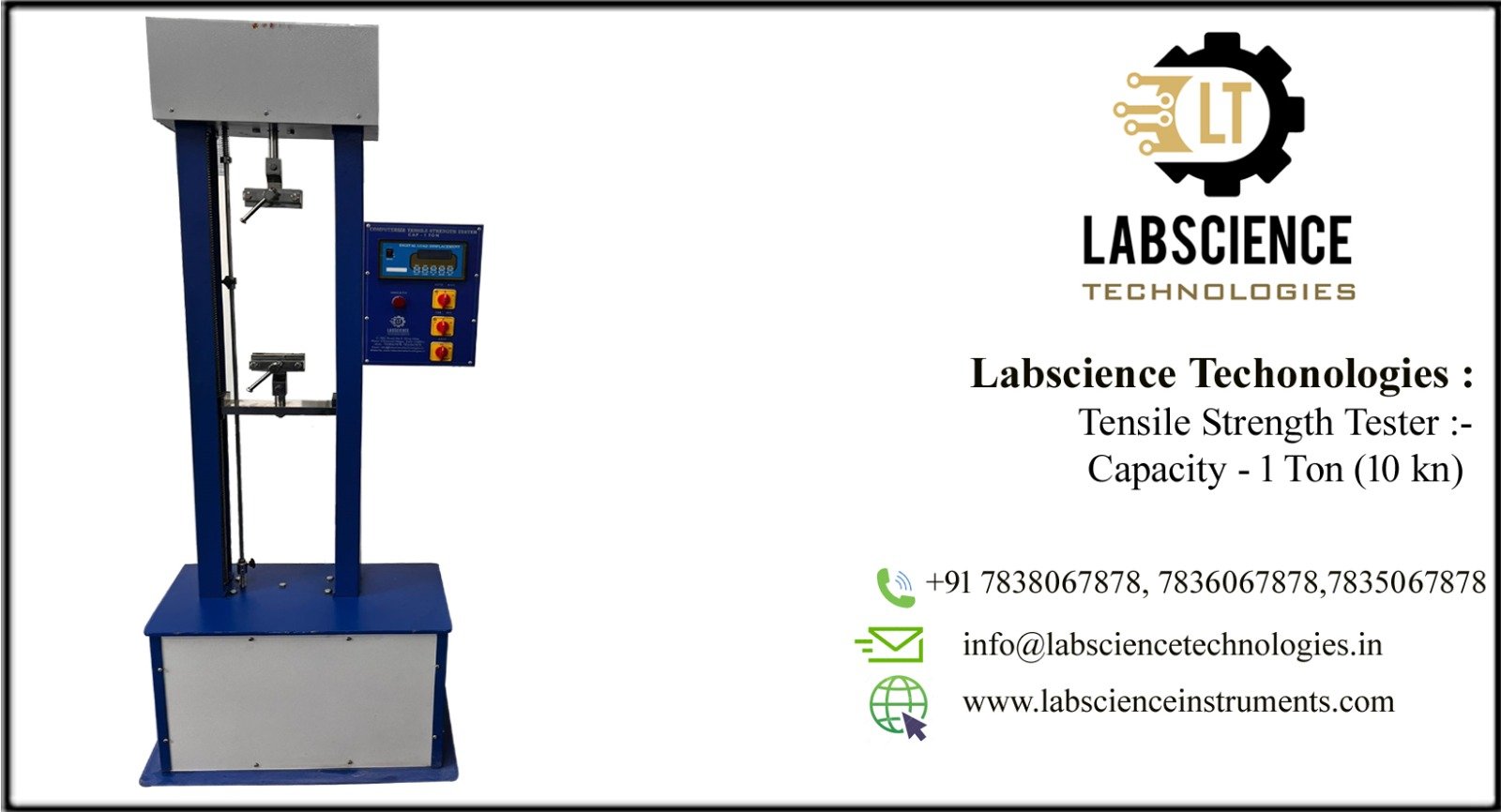ASTM Tensile Strength Tester
The ASTM Tensile Strength Tester is a precision instrument used to measure the tensile strength of materials according to ASTM (American Society for Testing and Materials) standards. Tensile strength testing is essential for determining how much force a material can withstand when pulled before it fractures. This test is critical in industries like plastics, metals, textiles, and rubber to ensure that materials meet specific performance and safety requirements.
The tester works by applying a controlled tensile force to a sample, steadily pulling it apart until it breaks. During the process, the machine measures the force applied and the material’s elongation. ASTM standards, such as ASTM D638 for plastics or ASTM E8 for metals, provide precise guidelines on how the test should be conducted, including parameters like sample dimensions, test speed, and environmental conditions.
Key features of the ASTM Tensile Strength Tester include high-precision load sensors for accurate force measurement, customizable grips to accommodate different materials, and advanced software for real-time data logging and analysis. These machines ensure repeatable, reliable results, allowing manufacturers and researchers to analyze material properties like yield strength, elongation at break, and modulus of elasticity.
By adhering to ASTM standards, this tester ensures that materials meet industry requirements, enhancing product safety, reliability, and overall quality in manufacturing and development processes.
The ASTM Tensile Strength Tester is equipped with several advanced features that make it a highly efficient and reliable tool for testing material properties according to ASTM standards. Here are its key features:
Precision Load Cells: The tester is equipped with high-accuracy load cells to ensure precise force measurements. These sensors measure the tensile force applied to the material sample with high precision, ensuring consistent and accurate results.
Variable Speed Control: The tester offers adjustable speed settings to accommodate various material types. This feature ensures that the machine complies with different ASTM standards, such as ASTM D638 for plastics and ASTM E8 for metals, which specify different test speeds.
Interchangeable Grips: The machine includes a range of grips and fixtures designed for different materials and sample shapes. This flexibility allows testing of various material types, including polymers, metals, textiles, and composites.
Digital Display and Data Logging: The tester comes with a digital display for real-time monitoring of tensile strength, elongation, and breaking points. Integrated software allows for automatic data logging and exporting, making it easy to analyze results and generate reports.
Compliance with ASTM Standards: The tester is designed to meet a variety of ASTM standards, ensuring that tests are conducted uniformly and that results are globally recognized and accepted.
Robust Frame Construction: Built with a durable and rigid frame, the tester can withstand high forces and continuous use, making it suitable for both laboratory and industrial environments.
These features make the ASTM Tensile Strength Tester essential for ensuring material quality and safety.
The ASTM Tensile Strength Tester is a high-precision instrument engineered to measure the tensile strength of materials according to ASTM standards. Here are the key specifications:
Load Capacity: Typically, ASTM Tensile Strength Testers offer a load capacity ranging from 1 kN to 100 kN or more, depending on the model. This allows the tester to handle a wide range of materials, from soft plastics to high-strength metals.
Test Speed: The machine supports adjustable test speeds, typically ranging from 0.001 mm/min to 500 mm/min, in compliance with ASTM standards like ASTM D638 and ASTM E8. This versatility ensures compatibility with various material testing requirements.
Grips and Fixtures: The tester comes with interchangeable grips to accommodate different sample types and sizes. Grips are available for thin films, solid materials, and fibers, ensuring that the machine can handle a variety of materials with consistent results.
Load Cell Accuracy: The load cells are highly accurate, with precision within ±0.5% of the reading, ensuring the reliability of force measurement during testing.
Crosshead Travel: The crosshead travel length varies by model, typically ranging from 600 mm to 1200 mm, allowing for the testing of both short and long specimens.
Digital Display and Software: The tester features a digital control panel with a touch interface, providing real-time monitoring of force, elongation, and test duration. Advanced software is included for data acquisition and analysis, with output options such as USB or RS-232.
Power Supply: Operates on standard 220V AC, 50/60Hz power supply, ensuring compatibility with most industrial setups.
These specifications ensure precise, repeatable results, making the ASTM Tensile Strength Tester essential for material testing in industries like manufacturing, construction, and research.
Kindly fill this form to demand a call-back to from our client support boss with esteeming and details.
Call our Specialists for the Best Deal
+91 7838067878
Call Now
+91 7838067878

